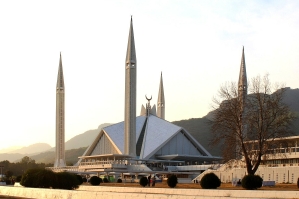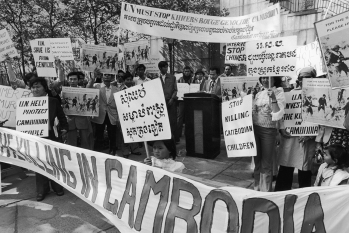
Two months after a Muslim told a Christian in Pakistan he could not stop him from taking the Christian’s 13-year-old daughter for marriage to his 28-year-old Muslim son, the girl was kidnapped on March 13, her father said.
Shakeel Masih said his daughter, Roshni Shakeel, had spurned the advances of Muazzam Mazhar before the young Muslim man kidnapped her from her home in Basti Khaliq Pura in Multan District, Punjab Province.
Masih said that Muazzam Mazhar’s father, Mazhar Abbas, called him from Saudi Arabia where is working two months ago and demanded Roshni’s hand in marriage for his unemployed son.
“You have a beautiful daughter, and it would be better for you to give her to my son yourself – there’s nothing you ‘Chuhras’ can do to stop us from taking her,” Abbas told Masih, the 33-year-old Christian father said. Chuhra is a pejorative term used for Christians in Muslim-majority Pakistan.
Masih said he flatly rejected Abbas’s demand, telling him that under no circumstances would he agree to marry his daughter into a Muslim family even if she were of marriageable age.
“I stopped taking Abbas’s phone calls after that, and this offended him to the extent that he encouraged his son to abduct Roshni and forcibly marry her,” Masih told Christian Daily International-Morning Star News.
Two days after Roshni’s abduction, local Muslim Bilal Hatim told Masih that he should give up hope of finding his daughter because she had converted to Islam and married Muazzam Mazhar, Masih said.
“On March 15, Bilal Hatim told me that he had information that Roshni had converted and married Mazhar of her own will,” Masih told Christian Daily International-Morning Star News. “He said that instead of wasting money to find her, I should consider reaching a settlement with the accused’s family to protect my honor. I turned down his offer, saying that I wanted my daughter back at all costs even if it meant putting my honor at stake. Roshni’s just a child, and I love her with all my heart. How can I forsake my own flesh and blood?”
After Masih went to police who refused to take action, he filed a petition in the Multan Bench of the Lahore High Court on Monday (March 18) for Roshni’s recovery, expressing fear for her life. Only then did he learn that his daughter had appeared at sessions court that day and recorded a statement, apparently under severe coercion as typically happens in such cases, in favor of the suspect.
“We were only verbally informed by the police about Roshni’s statement in court,” Masih said. “To date, I have not formally received any document regarding her conversion and marriage. I only know that they have shown her to be 18 years old in the marriage certificate that was allegedly documented on March 11, two days before she was taken.”
The Christian said Abbas, who lives in Saudi Arabia with his second wife while his two sons from his first marriage live with their aunt in Pakistan, orchestrated his daughter’s kidnapping.
“The accused used to force my daughter to befriend him, but she turned down his offers and brought the matter to my notice,” Masih said. “I complained about his lecherous behavior several times, but instead of stopping him, his family encouraged him to continue with his evil actions.”
The impoverished Masih, who works as a cleaner at a restaurant, said Roshni had stopped going to school after grade seven because she did not like to recite quranic verses taught in the government-run institution.
“Roshni did not feel comfortable in that school because of the overtly Islamic education imparted there,” he said. “Despite my meager resources, I was determined to educate my children and told her that she should continue her studies at home. I will never believe that a girl who did not like quranic studies has suddenly grown so interested in that faith that she converted. Her conversion and marriage are just a cover for sexual abuse.”
‘Poor Access to Justice’
Highlighting the systemic challenges faced by vulnerable Christians in seeking justice in Pakistan, Masih said police worked hand in glove with criminals.
“The Sital Mari police have shown prejudice from the onset of the case,” he said. “I informed them within minutes of Roshni’s abduction, yet no action was taken for hours. We pleaded with them to stop the abductors from leaving the city, but they simply refused to budge.”
A member of a local Brethren church, Masih said repeated visits to the police station the following day also failed to prompt any action.
“Our pleas fell on deaf ears,” Masih said. “It was as if the police deliberately delayed action to give advantage to the abductors. Their connivance in the crime became more evident when, after our hue and cry, they arrested the brother of the accused but released him soon after.”
In a desperate quest for justice, Masih sold household items, including mobile phones and his brother’s motorcycle, to fund efforts to find his daughter.
“I’m determined to bring my daughter back no matter what happens,” he said. “The high court will take up my petition on March 25, and I’m hoping that the judge will allow us a meeting with our daughter. We haven’t seen her since the time she was taken, and my wife and I are certain that she will be encouraged to change her statement when she’s not under the influence of the accused and the police.”
Human rights activist Joseph Jansen said police and other authorities in Pakistan facilitate crime instead of protecting minor victims from forcible conversion to Islam.
“It is particularly distressing to note the involvement of religious authorities, as well as the complicity of police and the justice system in facilitating these atrocities,” Jansen told Christian Daily International-Morning Star News. “Such actions blatantly disregard national and international human rights laws, which unequivocally prohibit such coercive practices.”
Jansen said that despite the legal framework provided by the Child Marriage Restraint Act, officials with Islamic mindsets lack the will to enforce such laws.
“This reluctance has emboldened perpetrators to continue their heinous crimes under the guise of Islamic marriage and conversion,” he said. “Without legislation specifically addressing forced faith conversions and adequate enforcement of the existing domestic laws, these harmful practices will persist.”
Pakistan ranked seventh on Open Doors’ 2024 World Watch List of the most difficult places to be a Christian, as it was the previous year.




